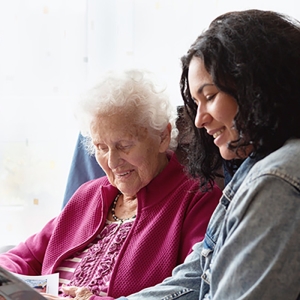Supporting the Invisible, Unpaid Army of Alzheimer’s Caregivers
October 07, 2021 / by Leigh Hopper- Research
There’s an invisible, unpaid workforce caring for the 6 million Americans currently living with Alzheimer’s disease. The USC Schaeffer Center for Health Policy and Economics estimates that 11 million family caregivers bear this emotional, physical and financial burden, mostly on their own.
USC experts say that while we wait for better Alzheimer’s treatments, there’s something we can do right now: Turn our attention to the caregivers.
“We have been waiting decades for efficacious treatments or a cure, but the social sciences have an important role to play in identifying opportunities to reduce the health, economic and social costs of Alzheimer’s disease and other dementias on care partners for persons living with the disease now,” said Julie Zissimopoulos, co-director of the Aging and Cognition Program at the USC Schaeffer Center and a principal investigator for two NIH-funded research centers focused on Alzheimer’s.
Zissimopoulos, an associate professor at the USC Price School of Public Policy, is also a co-author on the new report on dementia in America. Issues high on the report’s research agenda include examining the experience of living with dementia, including diagnosis, care and treatment; identifying the needs of family caregivers; and quantifying the cost of dementia.
“From assistive technology to aid caregiving to health care and social systems to support the health and quality of life of care partners, there are many aspects that society needs to grapple with if we are going to reduce the burden of this disease,” Zissimopoulos said.
Videoconferencing classes for Alzheimer’s caregivers may ward off depression
Maria Aranda, an associate professor at the USC Suzanne Dworak-Peck School of Social Work, said that educational classes offered by Alzheimer’s Los Angeles can be a lifeline for caregivers. Aranda is studying the impact of classes, including one she leads called Savvy Caregiver, designed to help caregivers of persons with memory loss gain information, confidence and help to ward off depression and anxiety.
“The classes are a source of knowledge about dementia and caregiving, and specific skills that caregivers can apply in real life. People realize they are not the only ones going through this situation. They see that other people — who may have been caregiving for even more years — are able to establish new strategies and coping skills,” Aranda said.
The COVID pandemic forced Aranda’s project to go remote, which made it more accessible to many people who didn’t need to find alternative care for their loved one. “The flip side of that is that if you want to engage in a class, you need a computer or device, you need to be able to navigate a video session. Remotely mediated interventions may increase accessibility, but they may increase the technology gap for caregivers who do not have these resources.”
Immigrants key to looming health aide shortage
Dowell Myers, a professor in the USC Price School of Public Policy and an expert in urban growth and societal change, believes that relief may come from an unexpected source: immigration.
“We are starting to wonder, where are the workers going to come from who are going to take care of the baby boom elderly? We know how many boomers will need home care, and it’s in everyone’s best interest to invest in that workforce, including legal immigrants,” said Myers, author of Immigrants and Boomers: Forging a New Social Contract for the Future of America.
“Immigrant workers bring with them an outstanding work attitude, but they also bring with them customs of how care is given at home in their home countries.”
The benefit of focusing on caregiving, Zissimopoulos said, is that improvements can get underway immediately. “Fortunately, we can make progress in all of these areas — without waiting for new clinical innovations.”
To reference the work of our faculty online, we ask that you directly quote their work where possible and attribute it to "FACULTY NAME, a professor in the USC Suzanne Dworak-Peck School of Social Work” (LINK: https://dworakpeck.usc.edu)
